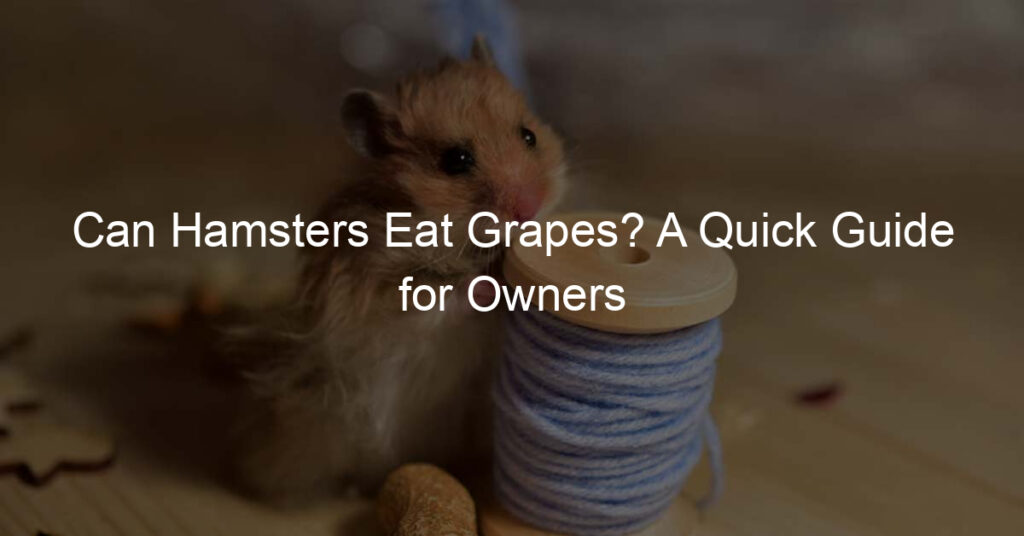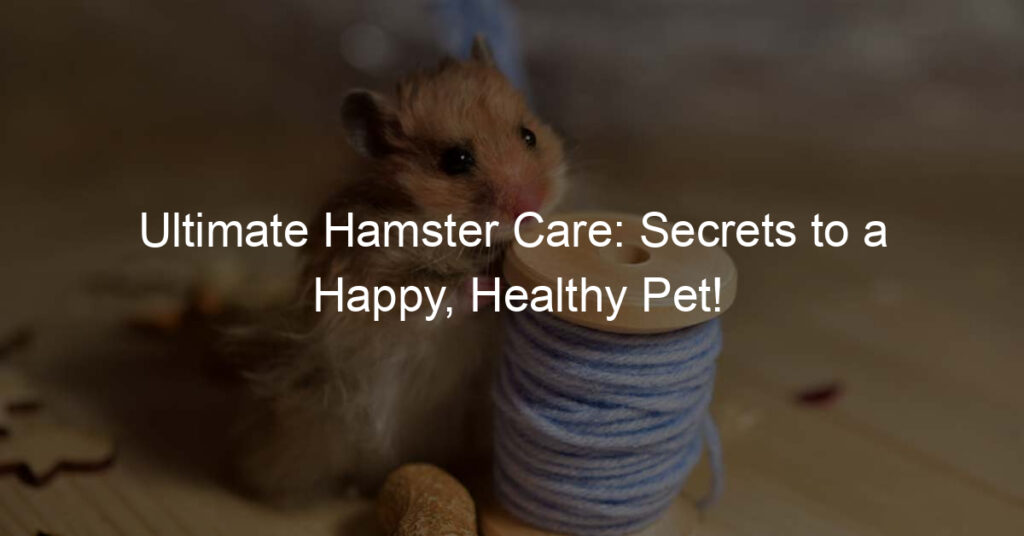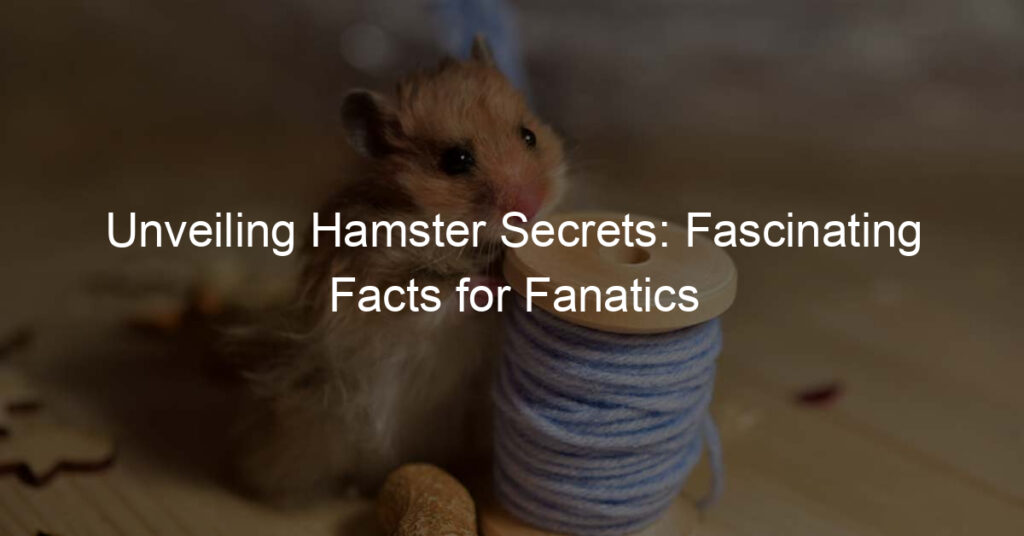Hamsters are popular small pets that are quite particular when it comes to their dietary needs.
As omnivores, hamsters enjoy a variety of fruits, vegetables, and proteins in their diet. One specific food item that may intrigue many hamster owners and raise the question of Can hamsters eat grapes.
These tiny fruits pack a flavorful punch, but can our little furry friends safely enjoy them?
Although hamsters can eat grapes, it is crucial to understand the proper way of serving them and the potential risks associated with their consumption. Grapes offer some health benefits, like vitamin C, which is essential for a hamster’s well-being.
Nevertheless, they must be fed in moderation due to their high sugar content, which, when consumed excessively, can lead to health issues such as obesity and diabetes.
Key Takeaways
- Hamsters can eat grapes but should be fed in moderation.
- Grapes offer various health benefits, but excessive consumption can lead to obesity and diabetes.
- Proper serving and understanding potential risks are essential for feeding grapes to hamsters.
Understanding Hamsters Dietary Needs
Hamsters are small, adorable pets that come in various sizes and breeds, such as Syrian hamsters and dwarf hamsters. As a responsible pet owner, it’s essential to understand their dietary needs to provide a well-balanced diet that will keep them healthy and happy.
Hamsters require a variety of nutrients to maintain their overall health, including proteins, vitamins, minerals, and fiber. A primary component of their diet should consist of hamster pellets, which are formulated to provide all the necessary nutrients.
In addition to pellets, they should have access to fresh water at all times.
Although hamster pellets provide essential nutrients, it’s also helpful to supplement their diet with a variety of fresh fruits and vegetables.
These additional foods can offer extra vitamins, minerals, and fiber that can benefit their digestive system and overall health.
When introducing fruits and vegetables to your hamster’s diet, it’s crucial to keep their size and age in mind. Smaller hamsters, such as dwarf hamsters, may need smaller portion sizes than their larger Syrian counterparts.
Moreover, senior hamsters may have different dietary requirements than younger ones.
Some key vitamins and minerals for hamsters include:
- Calcium: Important for strong bones and teeth.
- Vitamin C: Essential for maintaining a healthy immune system and preventing scurvy.
- Vitamin K: Vital for blood clotting and bone health.
While it’s crucial to provide a variety of nutrients, it’s also essential to be mindful of sugar content in their diet. Hamsters can be prone to diabetes, so limiting sugary foods can help prevent health issues.
Equally important is providing an adequate amount of fiber in their diet to aid digestion and prevent constipation.
Understanding your hamster’s dietary needs plays a significant role in their overall health and well-being. A diet consisting of hamster pellets, fresh fruits, and vegetables can help provide the necessary nutrients and prevent health issues.
Remember to tailor their diet according to their size, age, and breed for the best results.
The Basics of Grapes
Grapes are small, juicy fruits that come in various colors, such as green, purple, and red. They are not only delicious but also packed with essential nutrients that are beneficial for humans.
Regardless, when it comes to hamsters, it’s important to know whether they can safely consume grapes.
Grapes are rich in vitamins and minerals, including vitamin C, vitamin K, potassium, and calcium. These nutrients play a vital role in maintaining the overall health of both humans and animals.
Also, grapes contain antioxidants, which can help protect cells from damage caused by free radicals.
Other notable components of grapes include fiber, which aids in digestion, and sugar, which provides energy. Nonetheless, the sugar content in grapes can be a concern when feeding them to hamsters, as an excessive amount of sugar can lead to health issues such as obesity and diabetes.
Hamsters can safely consume grapes, but it is essential to offer them in moderation due to their sugar content. It’s also important to remove the seeds from the grapes, as they can pose a choking hazard for small pets.
Grapes are a tasty fruit option for hamsters when given in small quantities and with seeds removed. They offer essential vitamins, minerals, and antioxidants, but their sugar content should be taken into consideration.
Can Hamsters Eat Grapes
Hamsters can indeed eat grapes, but it’s essential to serve them in small quantities. Grapes are a delicious and healthy treat for hamsters when provided in moderation.
They can enjoy the natural sweetness and juicy texture while benefiting from the nutrients that grapes contain.
Grapes are a good source of vitamins, such as Vitamin C, and minerals that contribute to a healthy hamster diet. However, it’s important to note that grapes, like any other fruit, should not be the main component of their diet.
Instead, they should be considered a treat to complement their regular hamster food, such as pellets or seeds.
To serve grapes to your hamster, make sure to wash them thoroughly and remove any seeds or stems from the fruit. Cut the grapes into small, bite-sized pieces to ensure that your hamster can easily eat and digest the treat.
It’s best to offer grapes occasionally, removing any uneaten fruit after a few hours to avoid spoilage or attracting insects.
While grapes are safe for hamsters to consume, it’s crucial to remember that not all human foods are suitable for these small pets. Grapes and other fruits should always be introduced slowly and in moderation to avoid any potential digestive issues or an unbalanced diet.
Grapes can be a safe and enjoyable treat for your hamster when provided in small quantities and paired with a well-balanced diet. Doing so can help your furry friend maintain optimal health while offering a tasty and refreshing snack.
The Right Way to Serve Grapes
Hamsters can indeed eat grapes, but it is important to serve them properly to ensure the safety and health of your furry friend. Here are some helpful tips on how to serve grapes to your hamster in a friendly and caring manner.
First, make sure you use seedless grapes, as grape seeds can be a choking hazard for your little pet. Both green grapes and red grapes are suitable for hamsters, as well as purple grapes. All of these varieties can be a tasty treat when served correctly.
Before serving grapes to your hamster, start by thoroughly washing the fruit to remove any potential pesticides or contaminants from the skin. After washing, gently peel the grape to remove the skin, as it could be difficult for your hamster to digest and may cause potential health issues.
When it comes to serving size, remember that moderation is key. Grapes should only be offered to hamsters in very small amounts and not as a daily treat.
A tiny piece of grape, about the size of a small raisin, should be enough for your hamster to enjoy. This small serving size ensures that your hamster consumes grapes safely while still getting a delicious treat.
Serving grapes to your hamster can be a fun and enjoyable experience for both you and your pet. By selecting seedless grapes, washing and peeling them, and keeping the serving size small, you can treat your hamster to a healthy and tasty snack in a friendly, caring manner.
Potential Risks and Side Effects of Grapes
Grapes can be a delightful and nutrient-rich treat for hamsters when offered in moderation. Nonetheless, there are potential risks and side effects that could arise if hamsters are fed grapes without considering certain factors.
Grapes contain high sugar content, which can be harmful to hamsters if consumed in large quantities. Overconsumption may lead to diarrhea, digestive issues, weight gain, or even obesity, putting unnecessary strain on their little bodies.
Therefore, it’s crucial to limit grape intake and monitor any changes in your hamster’s behavior and health.
Seeds found in some grapes pose a choking hazard for hamsters. The small size of these seeds makes it easy for them to become lodged in your hamster’s throat, leading to dangerous situations. Make sure to only offer seedless grapes to your pet to avoid this risk.
Although grapes themselves are not toxic to hamsters, the presence of pesticides on the grape skins can be harmful. Ensuring that you wash the grapes thoroughly before feeding them to your pet is essential to remove any potential toxins.
If you’re still concerned, opt for organic grapes to minimize the risk of pesticide exposure.
Allergic reactions, while rare, can be a concern for some hamsters. Keep an eye on your pet after introducing grapes to their diet, and watch for any signs of distress or discomfort.
If you notice any adverse reactions, promptly remove grapes from their diet and consult your vet for further guidance.
Offering fresh, clean water alongside grape treats will help prevent dehydration, which can be exacerbated by high sugar intake. Ensuring your hamster has suitable access to water will support their digestive system in processing the grapes.
Lastly, avoid feeding raisins to hamsters as they are high in sugar and can cause the same problems as grapes, if not worse. Additionally, raisins pose an increased choking hazard due to their smaller, dehydrated form.
In summary, it’s essential to feed grapes to your hamster mindfully, considering factors like sugar content, seeds, pesticides, potential allergies, and appropriate water intake.
By doing so, you can treat your hamster to a tasty, safe, and nutritious snack.
Alternative Fruits for Hamsters
Hamsters, as omnivores, can enjoy a variety of fruits in their diet. Aside from grapes, there are plenty of other healthy and safe options for them to munch on.
In this section, we will explore a few alternative fruits that can be offered to hamsters. Remember to always introduce these fruits in small amounts and occasionally, as too much sugar can lead to weight gain and other health problems.
Apples are a great choice for hamsters, as they are low in calories and provide a good source of dietary fiber and vitamins. Be sure to remove the skin, seeds, and stem before offering a small piece to your hamster, as they can be harmful.
Pears provide a good balance of sweetness and hydration, making them a suitable occasional treat for hamsters. As with apples, remove the skin, seeds, and stem before giving your hamster a piece of pear.
Bananas can be a delicious treat for hamsters due to their sweet taste and rich nutritional content. However, they should be given sparingly, as they are high in sugar.
Berries, such as strawberries, blueberries, and raspberries, are another fruity option for your hamster. They are full of antioxidants and vitamins but can be high in sugar, so offer them only in moderation.
Oranges should be given to hamsters with caution, as their high acidity may not be well-tolerated by all hamsters. If you choose to give your hamster a small slice of orange, ensure to remove the peel and seeds beforehand.
Watermelon is a hydrating and low-calorie fruit that can be a refreshing treat for hamsters, especially during warmer months. Offer a small cube of seedless watermelon occasionally to help keep your furry pet well-hydrated.
In conclusion, there are many alternative fruits to grapes that can add variety and nutrition to your hamster’s diet. Just remember to offer them in moderation and always monitor how your hamster reacts to any new food introductions.
Health Benefits of Grapes for Hamsters
Grapes are not only a tasty treat for hamsters, but they also provide several health benefits. These small fruits are packed with essential nutrients such as fiber, vitamins, minerals, and antioxidants that can contribute positively to a hamster’s overall well-being.
One notable benefit of grapes for hamsters is their fiber content. Fiber is important for maintaining healthy digestion and preventing digestive issues. Consuming grapes, hamsters can keep their digestive system functioning optimally.
Grapes are also rich in various vitamins, including vitamin C and vitamin K. Vitamin C is essential in aiding the immune system, thus helping to protect hamsters from various illnesses.
Furthermore, vitamin K plays a crucial role in blood clotting and the maintenance of strong bones, ensuring that a hamster’s skeletal system remains robust.
Minerals found in grapes, such as potassium and magnesium, also have undeniable advantages for hamsters. Potassium contributes to the proper functioning of the heart and muscles, while magnesium helps with muscle and nerve health, making it vital for a hamster’s overall well-being.
Lastly, the antioxidants present in grapes offer several health benefits for hamsters. Antioxidants are essential in neutralizing damage caused by free radicals, thus helping to reduce the risk of heart disease and other chronic conditions.
While grapes should be given to hamsters in moderation, they undoubtedly offer an array of health benefits. The fiber, vitamins, minerals, and antioxidants found in grapes provide essential nutrients for a hamster’s well-being, helping to maintain their overall health.
Conclusion
In summary, hamsters can eat grapes, but it is essential to keep their consumption moderate and only as an occasional treat. Grapes have a high sugar content, which can lead to health problems like obesity and diabetes if consumed in excess.
Additionally, the small size of hamsters makes it difficult for them to chew and swallow grapes properly, increasing the risk of choking.
When introducing grapes to a hamster’s diet, it is best to start with a small portion and monitor the hamster’s reaction. If there are no digestive issues or negative effects, it’s safe to continue feeding grapes occasionally.
Remember to remove any uneaten grapes from their cage to prevent spoilage, and always ensure a balanced diet for your furry friend.
By being cautious and attentive to your hamster’s dietary needs, you can provide a safe and enjoyable treat while still maintaining their overall health and wellbeing.
Frequently Asked Questions
Is it safe for hamsters to consume grapes?
Yes, hamsters can safely eat grapes in small quantities. However, it is crucial to monitor their consumption as excessive grape intake can lead to potential health problems due to their high sugar content.
What are the potential risks of feeding hamsters grapes?
Feeding grapes to hamsters in excessive amounts can pose health risks. Grapes contain high sugar content, which, when consumed in large quantities, can lead to obesity and diabetes in hamsters.
Therefore, it is essential to provide grapes as an occasional treat and not as a staple part of their diet.
Do different hamster species react differently to grapes?
Although hamsters, in general, can eat grapes safely in small quantities, there are variations in the risk of developing health problems among different hamster species.
Some species, like dwarf hamsters, are more prone to diabetes, and excessive consumption of grapes or other sugary treats can increase this risk considerably. It’s essential to be aware of your specific hamster’s breed and adjust their diet accordingly.
Which fruits can be a healthy alternative to grapes for hamsters?
There are several fruits that can be offered as healthy alternatives to grapes for hamsters. You can consider providing small portions of apples, bananas, blueberries, cranberries, or strawberries.
These fruits, too, must be fed in moderation to maintain a balanced and diverse diet for your hamster.
Can I feed my hamster grapes in moderation?
Yes, you can feed your hamster grapes in moderation. It is best to offer grapes as an occasional treat rather than a daily part of their diet. Providing one or two small grape pieces once or twice a week should be sufficient to maintain a healthy balance in your hamster’s nutrition.
What are some safe human foods for hamsters?
Hamsters can enjoy many safe human foods in moderate quantities. Vegetables like broccoli, carrots, cucumber, spinach, and peas can be offered to your hamster.
As for fruits, apples, bananas, and berries are safe options. Always avoid feeding your hamster any foods high in sugar, salt, or fat, and remember to wash any fruits or veggies thoroughly before serving.








